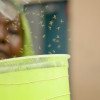COVID variants and vaccines
Interview with
In general, vaccines protect us against specific threats. But if that threat changes or mutates, the vaccine needs updating. This is why we periodically need to alter what goes into the flu vaccines we use each year. And the new coronavirus is no exception. In recent months, “new variants” of the virus have been picked up in several countries, and concerns have been raised whether these variants might be able to side-step the protection we’ve received from vaccination. Zania Stamataki is a viral immunologist at the University of Birmingham, and spoke with Eva Higginbotham...
Zania - Viruses replicate rapidly and if they stayed the same, then our immune system would vanquish them very, very quickly. And that's why they have evolved the ability to mutate. And the coronavirus that causes COVID 19 mutates once or twice a month. When these mutations lead to a virus that has different properties than its predecessor, then it's called a variant.
Eva - We think the coronavirus mutates once or twice a month, is that quite a fast replication in terms of viruses, or is that quite slow?
Zania - Compared to influenza, the flu virus, it is slower. It's a slower mutating virus. But generally mutations of once or twice a month can be considered significant enough for us to keep surveillance on an annual basis. We don't know when the new mutation is going to lead to a new variant, which means that the virus will have different properties. So we need to keep an eye on these things.
Eva - Why might these mutations and these new variants have an effect on the vaccines that we've made?
Zania - So vaccines that use viruses as blueprints to educate our immune system so that when we are infected, we have pre-existing defenses. When vaccinated, we make strong antibodies and T-cell responses against proteins of the virus that are harmless. If the variants are too different from the viruses used to make the vaccine, then we will need to update the vaccine with the new blueprints to the new virus.
Eva - And how can we tell if a vaccine is still going to work against a new variant? What kind of tests can we do to ensure that we're using vaccines that are actually going to work on the variant that's circulating through a population?
Zania - Well, public health officials monitor the incidence of disease, hospitalisations, and deaths in vaccinated people. And this is how we monitor effectiveness against new variants. But in the lab, we can test this very, very quickly. We can take a sample of blood, and we test to see if your antibodies and your T-lymphocytes, your T-cells, are effective against the variant. Antibodies raised by current vaccines were less effective against the South African variant, for example, which means that we had to use more of these antibodies to neutralise the virus in the lab. They weren't completely ineffective though.
Eva - I see. So it doesn't mean that the antibodies just don't recognise the virus at all. It just means that they recognise it slightly less. And so we need more antibodies in order to get a good effect.
Zania - Exactly. And it's very important also to remember, that just as the virus evolves, so does our immune system. So in natural infection, when a new virus variant emerges, our body will respond by making new types of antibodies to cover this new variant. And this is what we're going to try and do with vaccination as well, going forward, we're going to keep an eye on it, and we're going to update the vaccines to make sure that they are effective in the future.
Eva - Can we try and get ahead of the problem like we do with the flu vaccine, where basically every year, some scientists try and work out what variant of the flu is going to be the most problematic in the year to come. And so then we designed the vaccine against a predicted model of what the virus might look like. Can we do that for coronavirus and try to get ahead of the problem?
Zania - Absolutely we can. And we are doing this already. And just like with flu, there are virus hunters. They are sequencing viruses around the world every season, to update our vaccines for influenza. We need to keep surveillance on this coronavirus too. And the new vaccine technologies that we currently have, allow us to respond rapidly with new vaccine recipes. As individuals, there is something that we can do as well to make sure that our vaccines work for longer. We can continue to take steps to reduce transmission, and keep any new variants emerging in our own bodies to ourselves. We all know how to do that.










Comments
Add a comment